Medicine and Surgery (Graduate Entry)
UCAS code A101
- Study mode
- Full-time
- Duration
- 4 years
- Start date and application deadlines
-
- Start date
- August 2026
- Apply by:
- Starts on:
UCAS code A101
We've set the country or region your qualifications are from as United Kingdom.
Study medicine at Liverpool and prepare to deliver outstanding patient care, in both current and future healthcare systems. Learn how to apply a compassionate, evidence-based and patient-centred approach to your clinical practice as a doctor. The main medicine programme is our A100 ( five-year) programme but graduates with home-status may consider their eligibility to apply to our A101 (four-year) programme.
Your interest and skill in medical scholarship will be actively developed with us, underpinned by a vision to harness expertise from far and wide. You’ll learn the necessary knowledge, skills and professional behaviours to safely and ethically practice medicine.
Our students benefit from GP-led small group teaching sessions, access to some of the best specialist clinical units in the UK, and enhanced learning opportunities through our state-of-the-art facilities.
We ensure our graduates are able to meet the core requirements set out by the General Medical Council, and become lifelong learners committed to their own professional development.
Programme in detail
The curriculum is delivered under a spiral model, under which concepts are introduced at an appropriate level, and revisited with increasing levels of complexity as the course progresses.
The curriculum is organised and delivered through a number of supra-themes, which fall into specifically defined themes.
In year one, the Graduate Entry programme has its own bespoke timetable, with the cohort working together through the accelerated medicine programme. The Graduate entry cohort will study together for workshops, seminars and practical skills (e.g. clinical skills and anatomy) sessions, but occasionally join the larger A100 cohort for opportunities such as Leadership and management and lab-based research activities. All teaching in year one takes place on the University of Liverpool campus. At the end of the academic year, you’ll experience your first clinical placements in the NHS.
In years two to four, you’ll join the same timetable as the students registered on the A100 programme to undertake clinical placements. Local NHS Trusts, GP practices, hospices, specialist services and community services deliver the placement components of the programme. Each hospital placement takes place at one, or more, of the North West hospital sites. During the course of their studies, students will be expected to rotate through the different clinical providers for variable lengths of time, dependent upon placement block requirements and length. This block rotational model has been designed to allow improved student ability in managing transitions and working across different clinical environments to help prepare them for junior medical postgraduate training.
Discover what you'll learn, what you'll study, and how you'll be taught and assessed.
Year one recognises that the Graduate Entry programme is an “accelerated” programme, and therefore has been designed to cover the core knowledge base, skills and understanding students will need for a career in medicine.
Starting in August, the first year focuses on basic and clinical sciences, taught using an integrated ‘Systems’ approach. Each System Block includes physiology, biochemistry, pathology, microbiology, immunology, pharmacology and anatomy, genetics and cell and molecular biology. The emphasis of year one teaching is on the structure and function of the human body under ‘normal’ conditions, as well as what happens in ‘abnormality’ and illness-related change.
Students will have a mid year summative assessment in the form of a written paper, to ensure they are on track with the content.
Teaching is delivered through a mix of recorded lectures, face to face practical and small group sessions and clinical skills sessions (where students will learn how to examine the components of the systems studied, as well as take part in simulation exercises). Communication for Clinical Practice sessions in small groups with simulated patients prepare students for the clinical placements. Students in year one also take part in a unique leadership development course, which is run in collaboration with 208 Field Hospital.
Programme details and modules listed are illustrative only and subject to change.
Years two and three have an increasing focus on the application of skills learnt in the first year into clinical practice, across a range of core and increasingly complex clinical presentations and encounters.
In year two students gain exposure to the key principles of medicine and surgery, with the focus on understanding core clinical concepts.
Students spend a series of four-week blocks on clinical placement, where each placement block is preceded by an ‘Academic‘ week. This week incorporates approximately 1.5 days of lectures delivered to the whole cohort, and then rotation-specific teaching, e.g. pre-placement sessions, Community Clinical Teaching (Primary Care), clinical skills preparation, simulation sessions and time for student-led Research and Scholarship projects. This ‘Just in time’ approach to teaching, which encourages students to revisit and develop knowledge and skills just before they are needed, prepares students to learn to recognise health problems, develop the skills needed to diagnose illness and disease, and manage patients.
Students rotate through a variety of integrated hospital and community-based settings in order to complete placements. Students are expected to participate fully in clinical care in these settings, both through timetabled activities and additional opportunities (in agreement with supervising clinical staff). All of these placements provide opportunities (and expectations) to work with clinical teams and care for patients in a variety of healthcare settings.
Programme details and modules listed are illustrative only and subject to change.
In year three, the combination of academic weeks and placement blocks is again used to provide students with more specialist and challenging placement experiences, including a focus on mental health, specialist placements in neurology, paediatrics and obstetrics and gynaecology and a nationally recognised placement of excellence in palliative care.
At the end of year three students are also required to undertake a four-week elective. Many students choose to study abroad during this period.
Programme details and modules listed are illustrative only and subject to change.
The final year is spent gaining intensive clinical experience in hospitals and the community to support students to transition successfully beyond undergraduate training and begin work as a doctor.
Students experience Emergency and Acute Medicine and Surgery, and GP placements during this year, and have a ward shadowing experience block that allows them to consolidate complex clinical skills and professional attributes required of them for their Foundation Year post. Students are also required to undertake a research project such as an audit or Quality Improvement Project, a community based project or a specialist placement of their own choosing.
Placement experiences are supported by academic “Preparation for Practice” weeks, support for the required national examinations and a full week of interprofessional simulation, ensuring students are able to demonstrate the skills need to deliver complex, acute care within a multi-professional team.
Programme details and modules listed are illustrative only and subject to change.
The School uses an integrated teaching model. The learning of medical sciences is enhanced by the clinical context of a systems-based approach. The development of understanding of clinical practice is supported by a ‘just in time’ model of academic weeks that relate to each clinical placement and case-based teaching within each placement. Specialist clinical centres from across the region provide students with a wide range of exceptional placement experiences during which students complete structured learning activities as well as taking advantage of near patient learning opportunities.
The School is at the forefront of technology enhanced learning, utilising mobile learning, virtual reality, simulation and a personalised e-portfolio to provide our students with the best possible experience and prepare them for the technological developments that will shape their future careers in healthcare.
We take the development of clinical leaders seriously and use a programme of experiential learning opportunities to develop students’ leadership and followership skills in a range of situational contexts.
The remainder of the course is delivered using a mix of interactive and didactic lecturing; case based learning, small group teaching, clinical skills and simulation workshops, Human Anatomy Resource Centre (HARC) sessions, communication skills practicals and a staged programme of research skills development.
The breadth of learning and teaching activities used within the Medical School ensures students have the underpinning knowledge and skills to become the safe clinical practitioners of tomorrow.
Both formative and summative assessment take place within the programme. There is an emphasis on assessment for learning through the use of subject specific tests such as quizzes, anatomy spotters and formative Objective Structured Clinical Examinations (OSCEs).
Summative assessment takes place at the end of each year and includes written papers and practical exams in the form of OSCES and LOCAS.
We use technology to facilitate online marking and annotated feedback of written assignments, deliver formative online tests for students at the end of each teaching block and collate and deliver OSCE data, providing students with more useful feedback as a result.
A bespoke electronic portfolio, integrated throughout the curriculum provides students with a personalised learning space where they can collect evidence and develop their skills through reflective activities. The e-portfolio charts the student learning journey over the course of the programme.
We have a distinctive approach to education, the Liverpool Curriculum Framework, which focuses on research-connected teaching, active learning, and authentic assessment to ensure our students graduate as digitally fluent and confident global citizens.
The Liverpool Curriculum framework sets out our distinctive approach to education. Our teaching staff support our students to develop academic knowledge, skills, and understanding alongside our graduate attributes:
Our curriculum is characterised by the three Liverpool Hallmarks:
All this is underpinned by our core value of inclusivity and commitment to providing a curriculum that is accessible to all students.
Studying with us means you can tailor your degree to suit you. Here's what is available on this course.
University of Liverpool students can choose from an exciting range of study placements at partner universities worldwide.
Immerse yourself in Chinese culture on an optional additional year at Xi'an Jiaotong Liverpool University in stunning Suzhou.
Spend a summer abroad on a study placement or research project at one of our worldwide partner institutions.
Every student at The University of Liverpool can study a language as part of, or alongside their degree. You can choose:
Earn an additional undergraduate or master's degree by adding a year of intercalated study. Once you've completed your intercalation year - usually following your third year - you'll finish the rest of your programme.
The School of Medicine is one of the largest providers of medical education in the country. Students have access to facilities such as the unrivalled Human Anatomy Resource Centre and Clinical Skills Resource Centre, as well as our Virtual Learning Environment. We also offer access to a comprehensive placement network with nationally recognised centres of excellence.
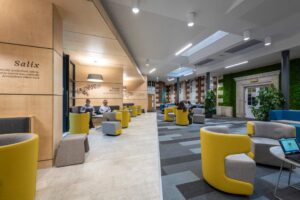
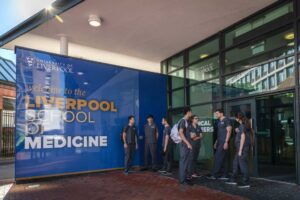
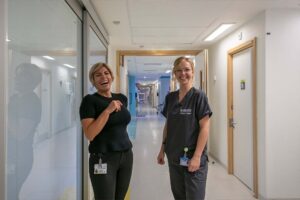
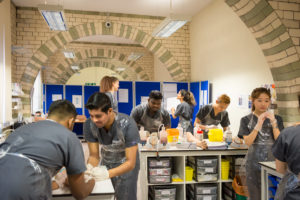
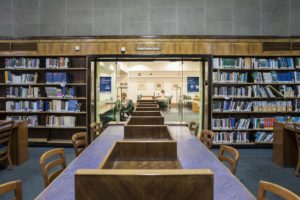

From arrival to alumni, we’re with you all the way:
It really is great to be on the ward - and that’s how you learn. The Medical School is very good and very supportive. It’s definitely set me up well for my future career, and I’m looking forward to getting into the job.

Want to find out more about student life?
Chat with our student ambassadors and ask any questions you have.
Our programmes are for individuals who wish to become qualified medical practitioners. A diverse range of careers are open to you as a medical graduate, varying from medical science, perhaps laboratory-based research, through public health and the development of health care strategies to clinical practice in the hospital and community.
99% of medical students find their main activity after graduation meaningful.
(Graduate Outcomes, 2018-19.)
My qualifications are from United Kingdom.
Your tuition fees, funding your studies, and other costs to consider.
Full-time place, per year - £9,790
Full-time place, per year - £50,000
Year abroad fee - £25,000 (applies to year in China)
The UK and international full-time fees shown are for the academic year 2026/27 (UK fees are subject to Parliamentary approval). UK year abroad and year in industry fees and international year in industry fees shown are for entry 2025, as 2026/27 fees have yet to be confirmed. Please be advised that tuition fees may increase each year for both UK and international students. For UK students, this will be subject to the government’s regulated fee limits.
Tuition fees cover the cost of your teaching and assessment, operating facilities such as libraries, IT equipment, and access to academic and personal support. Learn more about paying for your studies.
We understand that budgeting for your time at university is important, and we want to make sure you understand any course-related costs that are not covered by your tuition fee. This includes the cost of a stethoscope, travel to placements, and any additional sets of scrubs.
The School provides some equipment free of charge, but students should expect to cover the following costs.
Lab coat: Each student will be given a lab coat for use in the Human Anatomy Resource Centre free of charge. There is a £15 charge for any replacement lab coats.
Stethoscope: Students will need to purchase a stethoscope (approximately £90 plus).
Scrubs: Five sets of scrubs are issued per student during the programme. They are issued as follows: one set in year one and the further four sets in year two. If students require an additional set then they are required to purchase this themselves at a cost of £29.95.
Travel to placements: Placement travel costs will vary from student to student. Some students in receipt of a bursary from the NHS may be eligible to claim placement travel related expenses from the NHS. For students who are not in receipt of any other funding/reimbursement for placement travel, the School of Medicine is able to provide a contribution towards placement travel costs. This contribution is capped, and the cap is established each year based on the funding available. As a guide, in academic year 2022-23, contributions were made on the basis of calculated public transport costs. The average total travel costs for primary and secondary care placements for one year of the programme was calculated as approximately £775. The average contribution towards these costs provided by the School for 2022-23 was approximately £595.
For academic year 2024/25, placement travel contributions will be based on actual expenditure.
Electives: Elective costs will vary from student to student and could include; travel costs to the placement, agency costs to find the placement, accommodation and living costs, and public liability insurance costs.
We offer a range of scholarships and bursaries that could help pay your tuition and living expenses.
If you’re a UK student joining an undergraduate degree and have a household income below £35,000, you could be eligible for a Liverpool Bursary worth up to £2,000 for each year of undergraduate study.
If you’ve spent 13 or more weeks in Local Authority care since age 14, you could be eligible for a bursary of £3,000 per year of study. You’ll need to be a UK student joining an eligible undergraduate degree and be aged 28 or above on 1 September in the year you start.
Are you a UK student with a Black African or Caribbean heritage and a household income of £25,000 or less? You could be eligible to apply for a Cowrie Foundation Scholarship worth up to £8,000 for each year of undergraduate study.
If you’re a UK student identified as estranged by Student Finance England (or the equivalent UK funding body), you could be eligible for a bursary of £1,000 for each year of undergraduate study.
Joining a School of Biosciences degree and have a household income of less than £25,000? If you’re a UK student, you could apply to receive £4,500 per year for three years of your undergraduate course.
Do you live in the Liverpool City Region with a household income of £25,000 or less? Did neither of your parents attend University? You could be eligible to apply for a Nolan Scholarship worth £5,000 per year for three years of undergraduate study.
Are you a UK student with a household income of £25,000 or less? If you’ve participated in an eligible outreach programme, you could be eligible to apply for a Rigby Enterprise Award worth £5,000 per year for three years of your undergraduate degree.
Are you a UK student with a household income of £25,000 or less? Did neither of your parents attend University? You could be eligible to apply for a ROLABOTIC Scholarship worth £4,500 for each year of your undergraduate degree.
Apply to receive tailored training support to enhance your sporting performance. Our athlete support package includes a range of benefits, from bespoke strength and conditioning training to physiotherapy sessions and one-to-one nutritional advice.
Joining a degree in the School of Electrical Engineering, Electronics and Computer Science? If you’re a UK student with household income below £25,000, you could be eligible to apply for £5,000 a year for three years of study. Two awards will be available per academic year.
If you’re a young adult and a registered carer in the UK, you might be eligible for a £1,000 bursary for each year of study. You’ll need to be aged 18-25 on 1 September in the year you start your undergraduate degree.
My qualifications are from United Kingdom.
The qualifications and exam results you'll need to apply for this course.
Graduate applicants applying to the A101 programme (excluding dentists applying to the OMFS route) are currently required to have taken GAMSAT.
Applicants must consult our A101 Guidelines and A101 Departmental Supplement to the Admissions Policy and are usually expected to submit an online form. This is made available via our Admission information page in September of each year. Places on the programme are currently reserved for students confirmed with home status.
For more information about applying to our Medicine programmes, please read our full guidelines.
In the interests of public safety, and your own best interests, information pertinent to your educational achievements and to your fitness to practise may be shared by Liverpool Medical School with training providers, employers and regulatory organisations. In the event of termination of studies, student details are shared with regulatory bodies and other medical schools via the MSC Excluded Students Database. Any offer for the medical programme will be conditional on applicants having disclosed any previous fitness to practise findings against them.
| Qualification | Details |
|---|---|
| GCSE |
Achieving our minimum stated requirements in the GAMSAT admissions test is recognised as meeting our minimum English Language and Maths minimum requirements for this programme. |
| Work Experience Requirements | The A101 selection process will be weighted to prioritise the applications of those with significant work-place experience in a healthcare setting (two years paid employment), and professionally registered healthcare staff with post-qualification experience. Potential applicants are advised, as a minimum, to read the ‘statement on the core values and attributes needed to study medicine’ and ‘work experience guidelines for applicants to medicine’. These guidelines can be accessed via the Medical Schools Council website. |
| Duty of Care | Applicants to programmes in the School of Medicine should be aware that the professional body governing the practice of medicine (The General Medical Council) has specific requirements relating to the protection of both staff and patients. Students will be required to undertake an enhanced Criminal Records Bureau (CRB) check, undergo an occupational health check and be tested for and/or immunised against a range of infectious diseases prior to patient contact. See the General Medical Council website and the archived Department of Health guidance document. |
| International qualifications |
Many countries have a different education system to that of the UK, meaning your qualifications may not meet our entry requirements. You are advised to contact ENIC-NARIC for information on degree equivalency and can contact mbchb@liverpool.ac.uk for advice. Please note that students must have achieved home status to be accepted onto this programme. |
You'll need to demonstrate competence in the use of English language, unless you’re from a majority English speaking country.
We accept a variety of international language tests and country-specific qualifications.
| Qualification | Details |
|---|---|
| IELTS | 7.0 overall, with no component below 7.0 |
| TOEFL iBT | 100 overall, with minimum scores of L24 W24 R24 and S26 |
| Pearson PTE Academic | 69 overall, with no component below 69 |
| Cambridge IGCSE First Language English 0500 | Grade B overall, with a minimum of grade 2 in speaking and listening. Speaking and listening must be separately endorsed on the certificate. |
| Cambridge IGCSE First Language English 0990 | Grade 6 overall, with Merit in speaking and listening |
| Cambridge IGCSE Second Language English 0510/0511 | 0510: Grade B overall, with a minimum of grade 2 in speaking. Speaking must be separately endorsed on the certificate. 0511: Grade B overall. |
| Cambridge IGCSE Second Language English 0993/0991 | 0993: Grade 6 overall, with a minimum of grade 2 in speaking. Speaking must be separately endorsed on the certificate. 0991: Grade 6 overall. |
| International Baccalaureate English A: Literature or Language & Literature | Grade 6 at Standard Level or grade 6 at Higher Level |
| International Baccalaureate English B | Grade 7 at Higher Level |
Have a question about this course or studying with us? Our dedicated enquiries team can help.
Last updated 4 December 2025 / / Programme terms and conditions